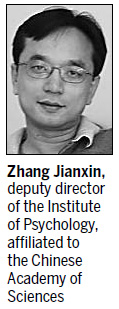Treating post-quake trauma
The third anniversary of theWenchuan earthquake, which killed more than 80,000 people, injured tens of thousands of others and caused a direct economic loss of about 845.1 billion yuan ($130.16 billion), is a time to mourn the dead and sympathize with the survivors. But May 12 is also a time to celebrate the resilience of the people and the building of a new Wenchuan from rubble.

In 2008, the Chinese government planned to rebuild Wenchuan in three years. But the task was completed before schedule, as Premier Wen Jiabao announced at the Fourth Session of the 11th National People's Congress in March.
In fact, Wenchuan's material reconstruction had basically been completed by the second anniversary of the quake, says Zhang Jianxin, deputy director of the Institute of Psychology, affiliated to the Chinese Academy of Sciences. "People are trickling into the 'new' county and their daily life is returning to normal," says Zhang, who visited Wenchuan recently.
But despite the material reconstruction, many people are still haunted by the devastation. These people need proper psychological counseling to overcome their grief. "And psychological reconstruction is an enduring task," says Zhang, who has been in charge of the psychological reconstruction program of the Institute of Psychology for the past three years. He heads the five workstations that the institute runs in the quake-hit areas.
Zhang and his colleagues began drafting their long-term counseling plan for the millions of quake survivors just after the quake. Some people are mentally strong and can absorb the loss of their dear ones, Zhang says. But others are not and suffer from mental setbacks to different degrees.
The strong ones can recover but those who cannot need psychological counseling and a long time to get back to normal life. Getting their life back on tracks is especially difficult for people who have lost their spouses and/or children. And occasions for family reunions like Spring Festival can be particularly torturous for them, for they bring back memories of their loved ones and heighten their pain.
Three years on some of them have remarried and/or become parents again, which should have helped relieve their pain. But that is not necessarily the case with all of them, for many are still wary of the future and lament their loss.
Many studies have been conducted after the quake to determine the rate of post-traumatic stress disorder (PTSD) among the survivors, and they show that 10 to 45.5 percent of them are suffering from the disorder.
The material reconstruction is complete and people are being relocated. But instead of bringing comfort, it has become a source of anguish for many. It's human nature to lament the past, irrespective of how troublesome it might have been. The relocation of surviving residents has made many compare their new dwellings with the old and with what others have got now, upsetting them further.
Zhang says the institute's workstations were first set up near temporary shelters built for the survivors. But instead of providing counseling immediately, his institute's staff members first surveyed the area to understand the survivors' needs. Only after that did they concentrate on their main task.
 0
0 






